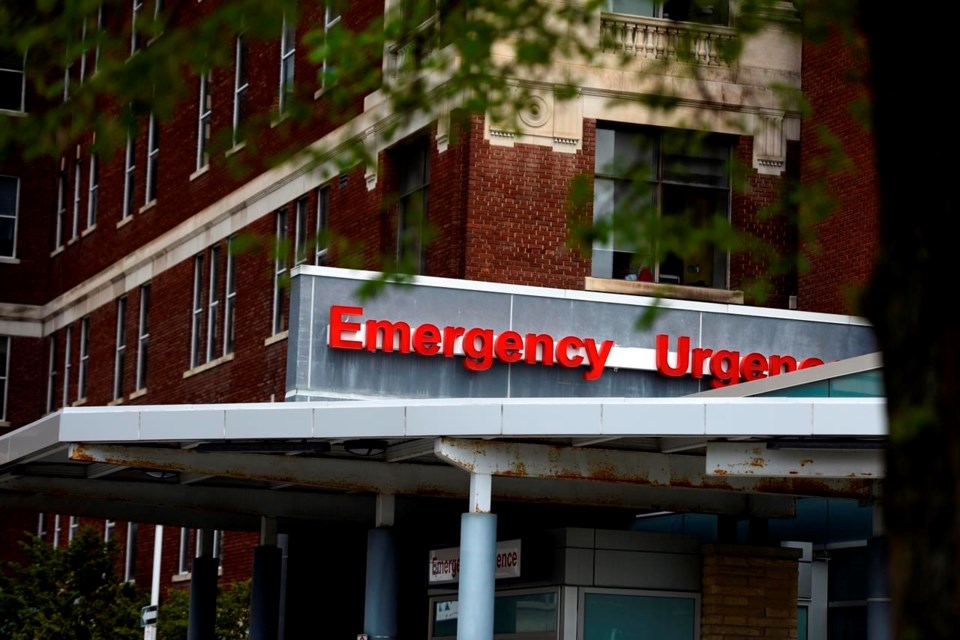Some Ontario hospitals are coming up with alternative solutions, including the use of unconventional patient spaces and new staffing models, to deal with high patient volumes and long wait times as cases of COVID-19 and other illnesses rise.
The Ottawa Hospital said recent high patient volumes have been straining its capacity, while staff pressures and ongoing COVID-19 cases have made it difficult to manage the issue.聽
The hospital said it has prepared several "temporary unconventional spaces," including a gymnasium, that could be used to care for patients if needed.聽
"Our teams have worked extremely hard to identify these temporary spaces that could become care areas if needed. They have also been adjusted to maintain patient safety, comfort and experience," the hospital wrote in a statement posted on Twitter.聽
"This means that we will increase bed capacity and adjust our staffing models as the situation continues to evolve."
Meanwhile, the Pembroke Regional Hospital said it plans to use "innovative staffing models" to help address staff pressures.聽
It said it will use a team-based approach and will allow health teams to expand to include new roles.
As examples, the hospital noted that rehabilitation assistants were introduced to hospital operations and it was also working to expand the scope of pharmacy technicians.聽
"More recently though we have integrated health care aides who are supporting clinical operations on our rehabilitation, acute mental health and intensive care units, with further expansion of this model planned for other clinical units," Beth Brownlee, vice-president of clinical and support services, wrote in a statement.聽
"We have also added Unit Support Workers to our Medical program to assist with non-clinical duties."
The moves by the two hospitals come as several hospitals across Ontario say they're facing high patient volumes that are straining staff, challenging capacity and leading to delays in admitting patients.聽
The Windsor Regional Hospital said a "higher than normal" influx of patients was causing delays in its ability to admit patients to its hospital from the emergency departments. It noted that 44 patients admitted to its emergency departments were waiting for in-patient beds to become available on Monday morning.
The hospital said the increased number of patients was putting pressure on its staff, despite the hospital having nearly 60 more beds and around 400 additional clinical staff compared to pre-pandemic times.
"WRH is anticipating additional patient volumes as flu season and any resurgence in COVID-19 cases arise this fall," it wrote in a statement.聽
"We continue to work with our local partners to address recent challenges regarding patient volumes as best we can. In the meantime, patients and families should continue to anticipate longer than normal wait times for non-emergency cases."
The Niagara Health hospital network also said it was dealing with high patient volumes while having 600 staff vacancies.聽
"We are seeing an increase in the number of patients in the hospital due to a variety of factors but our team is committed to continuing to provide all patients with extraordinary care," it wrote in a statement.聽
The network said it was taking different measures to alleviate the pressure, including recruiting and retaining health workers, working with family doctors and other primary care providers, and enhancing academic partnerships to train future staff.
Erie Shores Healthcare, meanwhile, said it was seeing the same amount of patients in its emergency department as pre-pandemic times but it was taking longer to admit them, which meant there were fewer spots in the ER available to treat people.聽
"That is coupled with the fact that the people coming to the hospital are generally sicker than normal, requiring more care," it said.聽
The hospital said it's trying to ease the pressure on its emergency room by hiring nursing students to help hospital staff and operating a separate "rapid assessment zone," where patients with less severe illnesses can be seen quickly.聽
In the Greater Toronto Area, the William Osler Health System said it was experiencing capacity pressures as well.聽
"Our emergency departments are seeing a high number of patients waiting for an inpatient bed, higher than usual acuity, an increase in patients with influenza-like illnesses and patients with COVID-19, as well as ongoing staffing challenges," it wrote in a statement, noting that all of those factors were resulting in longer-than-usual wait times.聽
This report by The Canadian Press was first published Oct. 19, 2022.
Sharif Hassan, The Canadian Press




